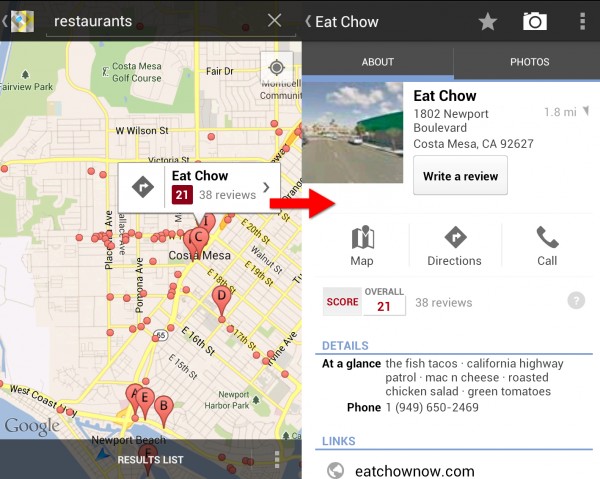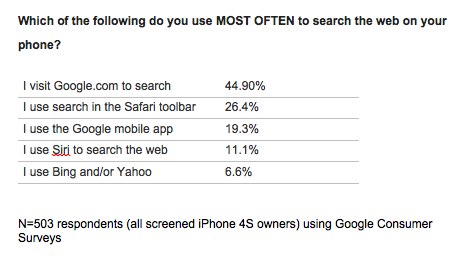Why Apple Is Going “Containment” Not “Thermonuclear” Against Google In iOS 6
I keep hearing people talking about Apple finally going “thermonuclear” on Google with the forthcoming iOS 6 mobile operating system. No, it hasn’t. In fact, there are good reasons why it can’t, though Apple is certainly exercising a much more subtle and smart containment strategy. Themonuclearly Renewing With Google The thermonuclear reference comes from the […]
 I keep hearing people talking about Apple finally going “thermonuclear” on Google with the forthcoming iOS 6 mobile operating system. No, it hasn’t. In fact, there are good reasons why it can’t, though Apple is certainly exercising a much more subtle and smart containment strategy.
I keep hearing people talking about Apple finally going “thermonuclear” on Google with the forthcoming iOS 6 mobile operating system. No, it hasn’t. In fact, there are good reasons why it can’t, though Apple is certainly exercising a much more subtle and smart containment strategy.
Themonuclearly Renewing With Google
The thermonuclear reference comes from the Steve Jobs biography written by Walter Isaacson, where Jobs was so upset about Google’s Android operating system — and the theft from Apple that he viewed it to be — that he said to Issacson in early 2010:
I’m going to destroy Android, because it’s a stolen product. I’m willing to go thermonuclear war on this.
Maybe Jobs was willing to go thermonuclear on Android, but that didn’t translate into going thermonuclear on Google’s search products. As I explained last year, Jobs renewed search deals with Google even after making that statement, keeping Google as the default search provider. Even a deal on Maps was extended.
We know relatively little about the deals between Apple and Google (see also my letter to the FTC suggesting that maybe consumers should know about such deals). But we do know that at his angriest, Jobs didn’t lash out and boot Google.
Why Apple Can’t Dump Google
One reason Jobs likely didn’t dump Google was because he couldn’t, not easily, not in the face of consumer opinion.
However much love Apple users have for Apple’s products, that doesn’t equate to them having to hate Google or its products like Google Search. Most of us are not rabid fanboys in our consumer choices. Plenty don’t want to “pick a side” between Apple and Google but rather pick the best products from both. Heck, even rabid-Android haters out there still use Google Search.
They do that because Google Search is good. It has the highest marketshare in most counties around the world, including the US (China, Russia, South Korea and Japan are key exceptions). Google is consistently selected as a top search choice when consumer surveys appear, as with Pew Internet’s recent one.
Even Jobs himself set Google Search aside. That thermonuclear reference? This is what Jobs said immediately after it:
They are scared to death, because they know they are guilty. Outside of Search, Google’s products— Android, Google Docs— are s**t.
I bolded the key part, where Google Search gets excepted from his dismissal of other Google products.
Why Did You Change My Search Choice?
Let’s say that Apple did boot Google as the default search engine in favor of the only real alternative in the US, Microsoft’s Bing. What happens? For one, Apple’s simply swapped out one fierce competitor for another. More important, it makes that change at a serious risk that consumers of its devices might get upset.
Recall that Verizon had a deal with Microsoft to make Bing the default on its phones back in 2009 (it later turned out that Android was exempted). When Verizon started changing things around with BlackBerry devices, it faced customer outcry over the move.
There’s an excellent chance that if Apple switched the default search in Safari on iOS to Bing, people would freak out asking where Google was. Sure, they could change the default. But it would still put Apple in the uncomfortable position of having to explain why it chose not the best search engine to use as a default but rather one based on competition issues. That’s not something you want to do, when you’re a company known for creating great products that keep the user in mind.
That’s not to say that Google is the best search engine out there. We don’t have independent metrics that assess relevancy like this. Instead, it’s widespread consumer perception that Google is the best that Apple has to contend with (and that Bing currently struggles with). Making Bing the default would raise the issue in ways I think Apple wouldn’t like. Moreover, if search quality wasn’t as good, Apple would face some blame.
Containment, Not Thermonuclear War
If we’re going to drag out the Cold War references, then let’s remember that neither the United States nor the Soviet Union thankfully ever went thermonuclear on each other. While there was a mutually assured destruction threat that kept both sides in order, perhaps “containment” is the better Cold War reference to use when considering Apple’s war with Google.
With containment, the US sought to stop the spread of communism to countries around the world. Apple’s strategy with iOS is really to contain Googlism where it can and push it back slowly where it makes sense, especially in ways that this can be positioned as a consumer benefit.

That containment wasn’t something average consumers widely understood, I’d say. To them, Siri was just some cool new tool that let you ask your iPhone for stuff. It was a subtle way to dump Google without consumers ever realizing that Apple dumped Google.
The Siri Search Engine
Potentially, Apple could build its own search engine. Various people have been speculating on that for years. I’m dubious about it, because I’ve seen just how difficult it is for companies to do search at scale. It’s not Apple’s core strength, and it would face huge competition from both Google and Microsoft.
Should you believe owning devices or the operating system means you win in search, think again. Microsoft had all those advantages win it first tried to win in search in 1998 with MSN Search. Despite tie-ins to devices, the browser, the operating system and all Microsoft’s efforts over the years, people still sought out Google. Even starting from scratch three years ago with the new technology and brand of Bing, people still use Google as much as ever.
No, what you do if you’re Apple is what you’re already doing. You keep growing Siri to work with other search partners, to keep Google contained, to win away areas of search where you feel confident Google won’t be missed.
Eventually, maybe you launch an Apple search engine that’s a web-based version of Siri. Perhaps you even call it Siri and make it available through Siri.com. Over time, as Siri continues to grow with answers to popular searches from selected providers, you might eventually change the “backup” search engine that kicks in for when you don’t have a partner. Silently, Google gets replaced by Bing.
That’s how you fight Google, if you’re Apple. No bombs get dropped; no consumer is even aware that you were fighting a war.
How Badly Does This Hurt Google?
As for Google, would it have been smarter not to have sparked this war by getting into mobile devices at all? Perhaps. Some like John Gruber believe so. I often look at Google doing its own browser, operating systems, mobile devices and wonder myself if it would be a more successful company without so many powerful enemies if it has stuck more closely to its search roots.
But Google’s an incredibly paranoid company. It created a browser out of fear Microsoft would block its services. Going into mobile devices similarly gave it a defense against being cut out. Not that Google didn’t have offensive aims. But mobile is so increasingly tied into search that gambling on having your own mobile platform at the risk of alienating Apple may have still made sense.
We can do the shoulda, coulda, woulda debate for ages, as well as the who was working on mobile first argument. But however Apple and Google arrived at this situation, it’s fiercely competitive now. So what’s containment means for Google? In the short term, Google’s potentially not losing as much as seems.
It Depends On What’s Being Contained
Spoken queries are cool, do seem significant and are growing. On Android, where voice search has existed for longer than the iPhone, Google executive chairman Eric Schmidt said at the end of 2010 that about 25% of queries were done by voice. But are these queries Google makes money off of?
From an revenue perspective, it doesn’t hurt Google much if its Siri rather than Google that tells Zooey Deschanel that yes, that is rain falling outside her window. She wasn’t clicking on a Google ad to learn that, anyway.
People are using Siri for searches that aren’t easy to mock, of course, but exactly what is hard to say. We know Wolfram Alpha gets about 25% of its queries from Siri, but what percentage that is of all Siri searches isn’t known. Even if that’s a big chunk, it’s mostly reference information that Google isn’t likely to earn off of.
We know that with Google, anywhere from 13% to 33% of voice searches may be local-related. If that holds true with Siri, those are potentially valuable searches that are being lost. But then again, in the way Siri currently routes local searches, no one — not Yelp, Apple or Google — seem to be making much money. That’s because those searches ultimately end up just showing phone numbers and addresses.
Maps: How Much A Google Loss?
That leads to the new Maps. A big loss for Google! Make no mistake, Google was concerned about it enough to hold a special pre-emptive mapping event last week. When iOS 6 comes out, no doubt we’ll see an actual Google Maps application that doesn’t exist now.
But how much does being dumped out of Maps hurt Google? Let’s recall how Google benefits from that now. Here I’ve done a search on Maps for restaurants, which brings up pins that lead to phone numbers and addresses:
It’s hard to see how much money Google is losing by being booted out of this, especially compared to how things work when you do the same thing using the Google Maps app on Android:
Now you’re being directed to a page on Google Local (er, Google+ Local) where Google has easier monetization opportunities.
This is going to change, of course. The new Maps will have “Info Cards” for 100 million businesses, and we got a brief look at these during the keynote. Here’s an image from VentureBeat’s coverage:

Credit: VentureBeat
Most interesting is the “Reviews” tab, a place where if Google had better relations with Apple, perhaps it might have been able to help populate and monetize. In the US, this partnership now goes to Yelp.
But in the near term, even the new Maps with Info Cards doesn’t seem to immediately cut into Google financially. There’s even potential that if Google does win users to its own Google Maps app, the company might do a bit better than it does now on iOS.
Google is going to lose the data about what people search for through Maps, data that might be useful to the company in many ways. However, Google still has lots of local data coming in from Android. It may also continue to get local data from iOS devices if people choose to use a Google Maps app there.
It’s Complicated
I keep talking about “near term,” because that’s the reality check needed here. No mushroom cloud just went off to vaporize Google. In the near term, Apple’s containment strategy doesn’t seem likely to have an explosive effect on Google.
It gets even more complicated to assess when you consider other factors. For example, if you search on Google now using Safari and get shopping results, those don’t generate revenue for Google (and thus potentially for Apple, if Apple’s paid off of ad revenues). But later this year, all of Google’s shopping results will effectively become ads.
This means that even though Google might see fewer queries coming from iOS devices, Google may still make more money off those queries. Here’s another twist. Some of those listings — the ones that appear when people search directly on Google Shopping rather than getting links in a “Sponsored” shopping box — might not be considered ads. Rather than having to share that revenue with Apple (if that’s the agreement now), Google might keep it all.
That make your head hurt? Sorry. The world of paid inclusion is a tricky space. It gets more confusing when we don’t know the terms of Google pays Apple for searches. Factor in further confusion in that we’re still discovering how people really search on the iPhone in the wake of Siri.
Consider this survey that Search Engine Land corresponding editor Greg Sterling did recently:
He did that using the Google Consumer Surveys service. It suggests, as I wrote before, that there’s a strong loyalty or at least habit of going to Google directly.
Stay tuned. We’ll be digging further into whatever we can dig up on consumer search habits with the iPhone and the iPad. It’s another important piece to the puzzle about how all this plays out.
Breaking Up Is Hard To Do
For the near term, Google looks to remain the default in Safari for most of the countries where the iPhone and iPad are sold, and that leaves it pretty integrated into iOS. Siri might snip it out of some spoken queries, but it seems likely there will be plenty of valuable long-tail traffic Google will keep getting along with plenty of important “head” traffic.
No doubt, Google would like to have the deep OS integration that Twitter has now and Facebook will get. I’d actually, as a user, like to have that as well. I get that type of thing on my Galaxy Nexus and Galaxy S II Android phones. I think iOS would be a better operating system if I, the user, get a choice about easily adding social systems I want to share with. But Google not being invited to that party may not be the disaster that some are predicting.
Long term is a completely different issue. As containment continues, Google could and probably will see deeper cuts that hurt. But I wouldn’t count it out. Even if a Siri search engine emerges from Apple, there are still reasons why consumers might deliberately seek Google.
Also remember that Apple is discovering some of the downsides that come with being a search engine. Anyone remember when Apple was being attacked for “Siri’s” abortion results or “Siri” saying that there were better smartphones than the iPhone? That was really down to how results came from its partners, but Apple still got blamed for them. The more Siri directly seems to answer things, the worse that’s going to get.
Ask Google. It’s not fun being a search engine when results get called into question. It’s especially not fun if eventually some company that doesn’t get to be your partner decides it’s time to launch an anti-trust complaint against your alleged dominance in the mobile space and how you’re leveraging it against them. That could happen.
Looking at all that, Apple might decide that it makes sense to stay with Google in various ways. After all, Google seems to be generating hundreds of millions to perhaps billions of dollars for it. Google’s almost certainly generating more revenue for Apple than any other search partner and has a proven record (that’s important; ask Yahoo how that Bing deal worked out). I wonder if Google is potentially one of Apple’s biggest revenue-generating partners period?
Maybe we’ll be able to ferret out more about that. But suffice to say, Google’s a major trading partner with Apple. You don’t go thermonuclear on a trading partner, not if they’re making you plenty of money and you can try to maintain an upper-hand in other ways.
Related Articles
- “Grand Theft” Android: Jobs Bio Reveals Intense Anger At Google, But Didn’t Block Search Deals
- Apple Renews Maps Deal With Google — What’s Up With That?
- As Verizon Implements Bing Default Search Deal, Company Sees User Backlash
- Report: Voice Searches 3X More Likely To Be Local
- Survey Paradox: People Like Google But Not What It’s Doing
- WSJ: Apple Has Been Planning Google Maps’ Ouster “For Years”
- Will Apple’s Move Bring A Real & Perhaps Better Google Maps To iOS?
- Google Introduces Offline Maps For Mobile, Claims A Billion Users Globally For Maps, Earth
- Will Siri And Voice Search Change Mobile Marketing?
- Apple WWDC Keynote: Retina-Display MacBook Pro, iOS 6 Gets Facebook, Smarter Siri & Apple’s New Maps
- Apple Siri To Add Sports, Restaurants, Reservations, Movies & App Search
- Apple Gets Into Local Search With New Maps App
- Apple Maps Could Launch With More Business Listings Than Google
- Google Product Search To Become Google Shopping, Use Pay-To-Play Model
- A Letter To The FTC Regarding Search Engine Disclosure Compliance
Contributing authors are invited to create content for Search Engine Land and are chosen for their expertise and contribution to the search community. Our contributors work under the oversight of the editorial staff and contributions are checked for quality and relevance to our readers. The opinions they express are their own.
Related stories
New on Search Engine Land


